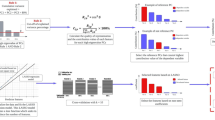Abstract
Principal Component Analysis (PCA) has been extensively used in different fields including earth science for spatial pattern identification. However, the intrinsic linear feature associated with standard PCA prevents scientists from detecting nonlinear structures. Kernel-based principal component analysis (KPCA), a recently emerging technique, provides a new approach for exploring and identifying nonlinear patterns in scientific data. In this paper, we recast KPCA in the commonly used PCA notation for earth science communities and demonstrate how to apply the KPCA technique into the analysis of earth science data sets. In such applications, a large number of principal components should be retained for studying the spatial patterns, while the variance cannot be quantitatively transferred from the feature space back into the input space. Therefore, we propose a KPCA pattern selection algorithm based on correlations with a given geophysical phenomenon. We demonstrate the algorithm with two widely used data sets in geophysical communities, namely the Normalized Difference Vegetation Index (NDVI) and the Southern Oscillation Index (SOI). The results indicate the new KPCA algorithm can reveal more significant details in spatial patterns than standard PCA.
Access this chapter
Tax calculation will be finalised at checkout
Purchases are for personal use only
Preview
Unable to display preview. Download preview PDF.
Similar content being viewed by others
References
Von Storch, H., Zwiers, F.W.: Statistical Analysis in Climate Research. Cambridge University Press, Cambridge (1999)
Haddad, R.A., Parsons, T.W.: Digital Signal Processing: Theory, Applications, and Hardware. Computer Science Press (1991)
Holmes, P., Lumley, J.L., Berkooz, G.: Turbulence, Coherent Structures, Dynamical Systems and Symmetry. Cambridge University Press, Cambridge (1996)
Lorenz, E.N.: Empirical orthogonal functions and statistical weather prediction. In: Final Report, Statistical Forecasting Project, 1959. Massachusetts Institute of Technology, Dept. of Meteorology, pp. 29–78 (1959)
Wallace, J.M., Smith, C., Bretherton, C.S.: Singular Value Decomposition of Wintertime Sea Surface Temperature and 500-mb Height Anomalies. Journal of Climate 5, 561–576 (1992)
Krzanowski, W.J.: Principles of Multivariate Analysis: A User’s Perspective. Oxford University Press, Oxford (1988)
Emery, W.J., Thomson, R.E.: Data Analysis Methods in Physical Oceanography. Elsevier, Amsterdam (2001)
Li, Z., Kafatos, M.: Interannual Variability of Vegetation in the United States and Its Relation to El Niño/Southern Oscillation. Remote Sensing of Environment 71, 239–247 (2000)
Thompson, D.W.J., Wallace, J.M.: Annular Modes in the Extratropical Circulation. Part I: Month-to-Month Variability. Journal of Climate 13, 1000–1016 (2000)
Hastie, T., Stuetzle, W.: Principal Curves. Journal of the American Statistical Association 84, 502–516 (1989)
Kramer, M.A.: Nonlinear Principal Component Analysis Using Autoassociative Neural Networks. AIChE J. 37(2), 233–243 (1991)
Monahan, A.H.: Nonlinear Principal Component Analysis: Tropical Indo–Pacific Sea Surface Temperature and Sea Level Pressure. Journal of Climate 14, 219–233 (2001)
Schölkopf, B., Smola, A., Müller, K.R.: Nonlinear Component Analysis as a Kernel Eigenvalue Problem. Neural Computation 10, 1299–1319 (1998)
Tan, J.: Applications of Kernel PCA Methods to Geophysical Data. George Mason University, PhD Thesis (2005)
Tan, J., Yang, R., Kafatos, M.: Kernel PCA Analysis for Remote Sensing Data. In: 18th Conference on Climate Variability and Change, Altanta, GA, CD-ROM, Paper P1.5. American Meteorological Society (2006)
Schölkopf, B., Burges, C.J.C., Smola, J.: Advances in Kernel Methods: Support Vector Learning. MIT Press, Cambridge (1999)
Mika, S., Schölkopf, B., Smola, A., Müller, K.R., Scholz, M., Rätsch, G.: Kernel PCA and De-noising in Feature Spaces. In: Kearns, M.S., Solla, S.A., Cohn, D.A. (eds.) Advances in Neural Information Processing Systems, vol. 11, pp. 536–542. MIT Press, Cambridge (1999)
Schölkopf, B., Mika, S., Burges, C., Knirsch, P., Müller, K.R., Rätsch, G., Smola, A.: Input Space vs. Feature Space in Kernel-Based Methods. IEEE Transactions on Neural Networks 10, 1000–1017 (1999)
Cracknell, A.P.: The Advanced Very High Resolution Radiometer. Taylor & Francis Inc, Abington (1997)
GES DISC (NASA Goddard Earth Sciences (GES) Data and Information Services Center (DISC)): Pathfinder AVHRR Land Data (2006), (Last accessed on February 9, 2006), ftp://disc1.gsfc.nasa.gov/data/avhrr/Readme.pal
Philander, S.G.: El Niño, La Niña, and the Southern Oscillation. Academic Press, London (1990)
Ropelewski, C.F., Jones, P.D.: An Extension of the Tahiti–Darwin Southern Oscillation Index. Monthly Weather Review 115, 2161–2165 (1987)
CPC (Climate Predication Center/NOAA): (STAND TAHITI - STAND DARWIN) SEA LEVEL PRESS ANOMALY (2006), (Last accessed on February 5, 2006), http://www.cpc.ncep.noaa.gov/data/indices/soi
NDMC (National Drought Mitigation Center): What is Drought? (2006), (Last accessed on February 8, 2006), http://www.drought.unl.edu/whatis/elnino.htm
Cox, T.F., Cox, M.A.: Multidimensional Scaling. Chapman and Hall, Boca Raton (2000)
Roweis, S., Saul, L.: Nonlinear Dimensionality Reduction by Locally Linear Embedding. Science 290, 2323–2326 (2000)
Tenenbaum, J.B., de Silva, V., Langford, J.: A Global Geometric Framework for Nonlinear Dimensionality Reduction. Science 290, 2319–2323 (2000)
Ham, J., Lee, D., Mika, S., Schölkopf, B.: Kernel View of the Dimensionality Reduction of Manifolds. In: Proceedings of the 21st International Conference on Machine Learning (2004)
Author information
Authors and Affiliations
Editor information
Rights and permissions
Copyright information
© 2008 Springer-Verlag Berlin Heidelberg
About this paper
Cite this paper
Yang, R., Tan, J., Kafatos, M. (2008). A Pattern Selection Algorithm in Kernel PCA Applications. In: Filipe, J., Shishkov, B., Helfert, M. (eds) Software and Data Technologies. ICSOFT 2006. Communications in Computer and Information Science, vol 10. Springer, Berlin, Heidelberg. https://doi.org/10.1007/978-3-540-70621-2_30
Download citation
DOI: https://doi.org/10.1007/978-3-540-70621-2_30
Publisher Name: Springer, Berlin, Heidelberg
Print ISBN: 978-3-540-70619-9
Online ISBN: 978-3-540-70621-2
eBook Packages: Computer ScienceComputer Science (R0)




